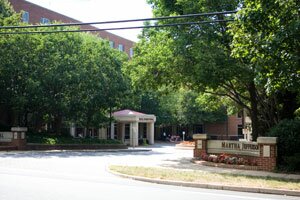Historic deal: Martha Jefferson to merge with Sentara
 Martha Jefferson Hospital also just sold its Locust Avenue facilities. PHOTO BY WILL WALKER
Martha Jefferson Hospital also just sold its Locust Avenue facilities. PHOTO BY WILL WALKER
Martha Jefferson Hospital announced today it will merge with Sentara, a regional health care system based out of the Hampton Roads area.
Like Martha Jefferson, Sentara is a not-for-profit. Unlike Martha Jefferson, Sentara already has nine hospitals, including the recently purchased Potomac Hospital in Woodbridge and the July-announced merger with Rockingham Memorial Hospital in Harrisonburg.
"They certainly have been on a tear acquiring hospitals," says Tom Brown, an attorney with McGuireWoods specializing in healthcare mergers.
Especially attractive to Martha Jefferson, which has revenues of $230 million, is that Sentara, with earnings of $3 billion, has the assets to capitalize the Charlottesville hospital.
Martha Jefferson President Jim Haden says the final numbers for a cash infusion from Sentara will be worked out over the next few months, but he stresses that it was the cultural fit, not the size of Sentara's bank account, that was most appealing in their union.
"Our goal has always to become a better hospital," he says, especially in maintaining quality and safety. And to get there, Martha Jefferson needs additional help, he adds.
For instance, Sentera is ranked number one in the country for its integrated systems, says Haden. And the move to electronic medical records is looming.
"It's not a matter of more hardware," says nephrologist and board member Kevin McConnell. "but where you use the data." That could mean pinpointing a cluster of flu outbreaks, or cameras in patients' homes, a high-tech revival of the near-obsolete house call.
"How do we work out the system so that we can take care of patients in their homes?" asks McConnell, who acknowledges that the desire to provide preventative care and keep people out of the hospital offers a "cognitive dissonance" coming from a hospital.
Martha Jefferson's Board of Directors began looking for a merger in 2008 and considered five different healthcare systems before settling on Sentara–- without a request for proposal.
"Three years ago I thought it was a crazy idea," says Dr. John Ligush, head of the Martha Jefferson medical staff. "Now I wish we'd done it three years ago."
According to the release, Sentara has never had a layoff and has no plans for layoffs here. Martha Jefferson Hospital will retain its name and a board of directors to handle local issues. And donations to Martha Jefferson will stay in the community, assures Haden.
 Martha Jefferson Board members: Dr. Kevin McConnell, president Jim Haden, and Peter Brooks all tout the virtues of a closer relationship with Sentara.
Martha Jefferson Board members: Dr. Kevin McConnell, president Jim Haden, and Peter Brooks all tout the virtues of a closer relationship with Sentara.PHOTO BY LISA PROVENCE
Approval of the deal will take about six months.
With healthcare reform, more hospital mergers are likely. "What's happening is very common," says attorney Brown. "Hospitals account for one of the least consolidated industries in the country."
For Martha Jefferson, the deal represents the end of an era. Founded in 1903 as the Martha Jefferson Sanatorium and taking a site near Locust Avenue the following year, it has recently been constructing a new home on Pantops Mountain.
In 2007, several years after announcing that it would leave the city for an 88-acre site at Peter Jefferson Place office park, Martha Jefferson began inviting proposals from developers and revealed just a week ago that it was selling its 8-acre Locust Avenue site for $6.5 million.
The seemingly low price for prime downtown real estate has raised some eyebrows. "That was the best bid we received," says Haden. And time was a factor with the impending move to Peter Jefferson Place next year. "We didn't want to leave an empty building," he says.
The not-as-high-as-expected sale of the property and the merger with Sentara have prompted some speculation that Martha Jefferson is facing financial difficulties.
Not true, says Peter Brooks, a Martha Jefferson board member who serves on its finance committee. "Martha Jefferson is in a very strong position financially," he says.
Even with building a new $275 million hospital, he says costs have been below projections. Brooks, too, has heard talk that Martha Jefferson is hurting. "It just plain upsets me because it's just not true," he declares.
Sentara was founded in 1888 as the Retreat for the Sick in Norfolk. It now provides care at more than 100 sites in Virginia and North Carolina, and its health plan, Optima Health, has 420,000 members.
And according to Martha Jefferson's McConnell, Sentera's girth will serve the local hospital well. "Sentara's size allows them to be heard," he says. "The government is interested in hearing from health systems about what is working and what isn't. The larger you are, the better chance to be heard."
Updated 11:45am.
Updated 4pm.
12 comments
There are laws against undervaluing the sale price in a property sale for the purpose of avoiding taxes, e.g nominal sale by a parent to a son or daughter.
There are laws against undervaluing the sale price in a property sale for the purpose of avoiding taxes, e.g nominal sale by a parent to a son or daughter.
***
Don't reasonable people gift or bequeath property to children in the way that makes the most sense tax-wise?
Of course, that doesn't really explain why Martha Jefferson and Sentara wouldn't want to make the maximum profit for the sale of the property, which would generally be from the highest price.
if they could have sold it for more they probably would have
What shortfall in lost taxes? The property was previously exempt from taxation, so the taxes paid will be a net gain. Just because the city overvalued the property doesn't mean that there will be a shortfall. Assessments get changed all of the time - every jurisdiction has a process to handle it.
This is an incredible deal. Wow. $6.5 million for a property assessed at $40+ million. Will the City now reassess the property at the sales price? If so, who will make up the shortfall in the lost taxes. Personally, I don't give a damn as to how much it will cost the developer to redevelop the property. That is his problem, and it should not be the taxpayer's responsibility to help him to foot his redevelopment bill by lowering the assessed value that he will have to pay in real estate taxes.
Does this mean that my Martha Jeff gift card is no longer valid?
Thanks for correcting the original copy which used the incorrect "Tidewater" to the proper name "Hampton Roads." You rock!
Martha Jefferson Hospital announced today it will merge with Sentara, a regional health care system based out of the Hampton Roads area.
"Hampton Roads" is not the "proper name" of any proper place. It's a common description of a general area.
This is not the place to debate such an issue, but I must respond to YES:
ââ?¬Å?HAMPTON ROADS” is a condensed version of the original name given by the region’s settlers to the harbor in southeastern Virginia known then as: Southampton’s Roadstead.
The term ââ?¬Å?Hampton” dates from the early 17th century when the first royal governor, Lord de la Ware, named the area in honor of The Earl of Southampton, a major investor of the Virginia Company of London, the financial backers of the Jamestown settlers. And, ââ?¬Å?Roadstead” is an old English word for a protected harbor.
Some things never change: just as sports stadiums, libraries, and college buildings today are named for major sponsors and donors, so it was then.
The third Earl of Southampton, Henry Wriothesley, was not only a Jamestown investor but also a patron of the arts and champion of young William Shakespeare.
ââ?¬Å?HAMPTON ROADS” refers to the body of water between the Virginia Peninsula (to the North) and Southside, the southern part of southeastern Virginia. It is formed by the confluence of the James, Nansemond and Elizabeth rivers and flows into the Chesapeake Bay whose watershed covers 64,000 square miles and all or part of six states (NY, PA, WV, MD, DE and VA) and DC.
ââ?¬Å?HAMPTON ROADS” is one of the world’s biggest and deepest natural harbors, the largest in North America, and is home to the world’s largest naval base at Norfolk. ââ?¬Å?HAMPTON ROADS” has been well known within nautical and maritime communities for centuries.
ââ?¬Å?HAMPTON ROADS” was widely adopted as the name for the surrounding region in 1984 when two planning districts and Metropolitan Statistical Areas (MSAs) merged, placing our region in the nation’s top 50.
As a regional moniker, ââ?¬Å?tidewater” was just too broad. It is a generic term used to describe a coastal plain with rivers that feed a bay or low coastal land that is inundated by water at flood tide. For instance, New Orleans is also a ââ?¬Å?tidewater.”
There are many ââ?¬Å?tidewaters” across the nation and the globe, but only ONE ââ?¬Å?HAMPTON ROADS.”
Located in the tidewater of Virginia, we are ââ?¬Å?HAMPTON ROADS.”
From http://smartregion.org/2009/01/how-did-hampton-roads-get-its-name/
Hampton Roads, the region and its citizens, deserve to be called by the proper moniker. We have:
• Size: well over 20% of Virginia's residents, 1.7 million of us, live in Hampton Roads;
• Stature: a natural geography that caused the America we know to be started in Hampton Roads;
• Significance: the largest concentration of federal assets outside of Washington, DC are in Hampton Roads, a military mission-ready region; and
• Vision: Hampton Roads is poised to be the premier East Coast Sea Port, premier year-round destination of distinction and host to centers of excellence, fueled by a culture of innovation and economic opportunities, in healthcare and life sciences, the environment, and in developing and implementing offshore wind energy and other coastal energy solutions.
We are part of the evolution and proudly fly the Hampton Roads name, flag and colors: http://smartregion.org/2009/03/hampton-roads-flag-the-first-regional-fla...
ââ?¬Å?HAMPTON ROADS” was widely adopted as the name for the surrounding region in 1984 when two planning districts and Metropolitan Statistical Areas (MSAs) merged, placing our region in the nation’s top 50.
***
As I said, Hampton Roads is not the name of a proper place, unless you're referring to the waterway. You can have any preference for name of the general region that you wish, but the intensity of your preference marks you as unsophisticated.
Very interesting information on "Hampton Roads", thanks for educating me.
For Martha Jefferson to have sold a property assessed at 40 plus million for 6.9mil, makes you wonder what the appraisal was, and how realistic the tax assessment could have been in the first place. It is probably a symptom though, of just how sick our national economy really is. One need only to look at Ebay to see small hospitals,schools and facilties of a number of types peppered in a number of urban, suburban and rural settings with a ridiculous "Buy It Now" price, to see how few people are available to re-develop such properties and provide employment to others.
If MJH is not hurting..."Then why? not give employees their yearly raises, do away with premium pay, freeze sick leave accumulation, and so forth. To me this sounds like someone "bit off more than they can chew." The new building is going to be nice, but who will be able to afford it?? Also with the new smoking policy in place, why don't you clean up those employees you have with tattoos all over their bodies, piercings everywhere and nasty foul language!! These are more offending than a person smelling like smoke!!! You have employees who go out and party every weekend, why don't you alcohol test them?? I'd rather have a smoker caring for me than someone with a hang-over!! Where did your standards go? I thought in nursing school you could not have tatoo's nor piercings?? I am more affraid of catching HepC from these than smelling smoke on someone!!!